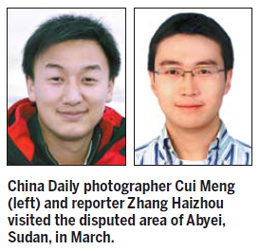Global General
Fear on the horizon at dawn of a nation
By Zhang Haizhou (China Daily)
Updated: 2011-04-21 08:42
 |
Large Medium Small |
|
REPORTER'S LOG Zhang Haizhou Despite conflict, links remain with north
It was an extremely hot and sunny afternoon on March 23 when we were walking through the market in Abyei. Two teenagers, marching side by side, caught our attention. When they passed us, we suddenly saw they both had machine guns strapped to their backs. They were patrolling the market. Our guide and driver, a 47-year-old from the local Ngok-Dinka ethnic group, said the teenagers were "volunteer youths" armed to protect the market. But he avoided my questions about where they got the guns. We followed them closely for a few meters. Cui was then inspired by the scene in front of him. He quickly picked up his camera and instantly focused on their guns. But just as he was about to take the photo, our guide quickly reacted. The former Sudan People's Liberation Army fighter rushed toward Cui, dragged him back and shouted: "Don't take pictures of them! Dangerous! It's not allowed!" Cui looked deeply upset. "Just half a second away," he said with a sigh. The war is a tribal conflict between the Misseriyas in the north and the Ngok-Dinkas in the south, with both sides claiming Abyei, and it looks set to drag on. While the government of south Sudan is trying hard to disarm tribal forces ahead of its declaration of independence on July 9, Abyei is being left out of the attempt. "How can we disarm ourselves when we are still facing enemies who want to kill us?" our guide said. The fight goes on and the Ngok-Dinkas told me how much they dislike the Misseriyas and the central government in Khartoum, because they believe it has offered weapons to the nomadic Arabic tribe. Despite the hatred, some small details show the strong links between Abyei and northern Sudan. Almost all consumer goods sold in the town's market are imported from the north, such as bottled water, medicines, soap, and even potatoes. A road connecting Abyei to the north was cut off at the end of last year, resulting in the soaring prices of all commodities from the north. The sugar price has risen by 60 percent. Our guide said the Ngok-Dinkas would keep fighting until the Misseriyas are out of Abyei. But please remember those who suffer the most in a war are always the ordinary people, especially the more vulnerable - the elderly, disabled, women and children. Rather than shouting, finger-pointing and fighting, a better way out may be for both sides to cherish the common ground they share and discuss possible compromises. The international community should do more and take more concrete steps to help the local people avoid another humanitarian disaster in Africa. |
|
Oil fuels the desire to run contested region by Zhang Haizhou ABYEI, Sudan - The Abyei issue may cause another dispute between north and south Sudan after the latter declares independence in July, as neither side seems likely to make any concessions on the possible oil-rich border town.Deng Arop Kuol, chief administrator of Abyei and a member of the Ngok-Dinka, a local ethnic group, said that the area should be part of south Sudan, adding that oil is the reason the north is claiming it. "Wherever they see oil, they want to claim it. We have nothing to compromise anymore," Kuol told China Daily, saying the Ngok-Dinkas have already lost large parts of Abyei's territory. In Khartoum, however, the ruling National Congress Party (NCP) of Sudan recently affirmed that its position on the Abyei issue is backed by the Protocol on Resolution of the Abyei Conflict and the international community. Leading NCP figure Mandoor Al Mahdi, said: "Abyei will remain part of north Sudan in accordance with 1956 borders and international arbitration, in case the referendum does not take place or the issue is not settled," Sudan Vision, a newspaper in the north, reported on March 29. "Both had acknowledged the right of all Sudanese residing in the area of Abyei to take part in the proposed referendum on whether Abyei belongs to the north or the south," the paper said. Under the 2005 deal signed by the Sudan People's Liberation Movement (SPLM) and the NCP, residents of Abyei, like those in south Sudan, were supposed to vote in a referendum in January 2011. The vote would have allowed people in Abyei to decide whether they should remain in Kordofan in central Sudan or return to Bahr el Ghazal in southern Sudan, from which they were detached in 1905. But the vote did not take place in Abyei, as the parties to the Comprehensive Peace Agreement (CPA) failed to agree on issues including voter eligibility. According to the Abyei protocol signed by the north and the SPLM in May 2004, the residents of Abyei shall be "the members of the Ngok-Dinka community and other Sudanese residing in the area". The protocol also defined the territory as "the area of the nine Ngok-Dinka chiefdoms transferred to Kordofan in 1905". A multinational border commission subsequently established this to be the areas of Kordofan south of 10 degree 22 minutes 30 seconds north. However, following continued disputes that erupted into violence and threatened the CPA, an international arbitration process redrew Abyei's boundaries in 2009 to make it significantly smaller, extending no farther north than 10 degree 10 minutes north. This revised border has since been endorsed by all parties to the dispute. Lying on the north-south border, Abyei has a total area of 10,460 square kilometers and a population of more than 150,000. |
| 分享按钮 |
 My photographer, Cui Meng, missed a perfect shot that we thought could otherwise be an image to best describe the situation here.
My photographer, Cui Meng, missed a perfect shot that we thought could otherwise be an image to best describe the situation here.